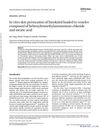4 citations,
January 2018 in “Journal of dermatology & dermatologic surgery” There is no gold standard treatment for hidradenitis suppurativa due to insufficient evidence.
 2 citations,
May 2023 in “Current Nutrition Reports”
2 citations,
May 2023 in “Current Nutrition Reports” Eating a Mediterranean diet and taking certain supplements may improve symptoms of PCOS.
 2 citations,
February 2023 in “BMC endocrine disorders”
2 citations,
February 2023 in “BMC endocrine disorders” Curcumin improved some metabolic factors in women with PCOS but did not affect cholesterol, insulin, or testosterone levels.
 2 citations,
July 2022 in “Stem cell research & therapy”
2 citations,
July 2022 in “Stem cell research & therapy” A new method quickly and efficiently isolates hair follicle stem cells from adult mice, promoting hair growth.
 2 citations,
June 2022 in “Cosmoderma”
2 citations,
June 2022 in “Cosmoderma” Regenerative medicine shows promise for improving hair and skin but needs more research for standard use.
 1 citations,
November 2023 in “BMC chemistry”
1 citations,
November 2023 in “BMC chemistry” Tadalafil and Finasteride may help treat aggressive melanoma.
 1 citations,
January 2023 in “Burns & Trauma”
1 citations,
January 2023 in “Burns & Trauma” Wnt4 protein makes the outer skin layer thicker in burn wounds by turning on a specific healing pathway and loosening the connections between skin cells.
 1 citations,
October 2022 in “Adolescent Health, Medicine and Therapeutics”
1 citations,
October 2022 in “Adolescent Health, Medicine and Therapeutics” Gender-affirming therapy can cause skin issues like acne and hair loss in transgender adolescents, and more research is needed on its dermatological effects.
 January 2023 in “Springer eBooks”
January 2023 in “Springer eBooks” Using one's own blood platelets and fat can improve facial and hair appearance without surgery.
 December 2022 in “BMC women's health”
December 2022 in “BMC women's health” The CNC® prosthetic system improved body image in breast cancer patients with hair loss from chemotherapy but did not significantly change their psychological wellbeing.
 November 2022 in “Orphanet Journal of Rare Diseases”
November 2022 in “Orphanet Journal of Rare Diseases” Long-term use of androgens can help manage Hereditary Angioedema (HAE) but may cause serious side effects, so alternative treatments with fewer side effects are being considered.
 August 2022 in “IntechOpen eBooks”
August 2022 in “IntechOpen eBooks” The best treatment for Frontal Fibrosing Alopecia and Lichen Planopilaris combines oral and topical medications to reduce symptoms and stop hair loss.
October 2021 in “Case Reports in Veterinary Medicine” The dog died from myxedema coma linked to severe atherosclerosis and thyroid issues.
 January 2023 in “International Journal of Zoological Investigations”
January 2023 in “International Journal of Zoological Investigations” Certain genetic variations in IL-16 may increase the risk of alopecia areata.
 4 citations,
April 2014 in “Journal of Pharmacology and Pharmacotherapeutics”
4 citations,
April 2014 in “Journal of Pharmacology and Pharmacotherapeutics” The boy's hair loss was caused by the tuberculosis drug isoniazid but grew back after stopping the medication.
 3 citations,
August 2017 in “International journal of reproduction, contraception, obstetrics and gynecology”
3 citations,
August 2017 in “International journal of reproduction, contraception, obstetrics and gynecology” People with PCOS have higher levels of PAI-1, which may increase their risk of heart disease and fertility issues.
 4 citations,
August 2013 in “Case reports in dermatology”
4 citations,
August 2013 in “Case reports in dermatology” A patient with total hair loss developed vitiligo after using a treatment called DCP.
 21 citations,
January 2015 in “Journal of Dermatological Science”
21 citations,
January 2015 in “Journal of Dermatological Science” Ginsenosides in Panax ginseng boost hair growth like minoxidil.
 July 2024 in “Natural Product Research”
July 2024 in “Natural Product Research” Nk-EE may help treat hair loss by promoting hair growth and preventing hair follicle damage.
January 2009 in “Springer eBooks”  18 citations,
June 2010 in “Journal of Chromatography B”
18 citations,
June 2010 in “Journal of Chromatography B” New method measures finasteride in blood quickly and accurately.
 165 citations,
September 2003 in “Toxicology and applied pharmacology”
165 citations,
September 2003 in “Toxicology and applied pharmacology” Blocking COX, especially COX-2, in the skin can reduce inflammation and pain and may help prevent skin cancer.
 40 citations,
January 2013 in “Journal of Korean Medical Science”
40 citations,
January 2013 in “Journal of Korean Medical Science” Iron deficiency may contribute to hair loss.
 5 citations,
February 2010 in “Drug development and industrial pharmacy”
5 citations,
February 2010 in “Drug development and industrial pharmacy” Vesicles made of behenyltrimethylammonium chloride and stearic acid can triple the skin absorption of hinokitiol, which may help with hair growth.
 4 citations,
May 2007 in “Journal of Dispersion Science and Technology”
4 citations,
May 2007 in “Journal of Dispersion Science and Technology” Hinokitiol in cationic vesicles promotes hair growth better due to higher skin retention.
 June 2020 in “Journal of genetic medicine”
June 2020 in “Journal of genetic medicine” The document's conclusion cannot be provided because the document is not accessible or understandable.
 24 citations,
December 2011 in “Journal of The American Academy of Dermatology”
24 citations,
December 2011 in “Journal of The American Academy of Dermatology” Caucasian hair is denser, but Asian hair is thicker in female pattern hair loss patients.
 65 citations,
February 2009 in “The journal of investigative dermatology/Journal of investigative dermatology”
65 citations,
February 2009 in “The journal of investigative dermatology/Journal of investigative dermatology” Anti-acne medications may work by reducing the activity of a protein involved in acne development.
 53 citations,
March 2014 in “Cold Spring Harbor Perspectives in Medicine”
53 citations,
March 2014 in “Cold Spring Harbor Perspectives in Medicine” The document explains different types of hair loss, their causes, and treatments, and suggests future research areas.

























